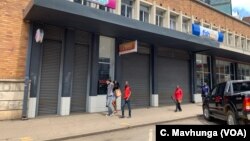Life came to a standstill in Zimbabwe's capital Tuesday after protests over a massive hike in fuel prices turned deadly.
The streets of Harare were virtually empty, with many businesses, banks and schools closed, following a call for a three-day strike by the Zimbabwe Congress of Trade Unions in response to an intensifying economic crisis.
Despite the relative calm due to the strike, police and protesters clashed once again, as a military helicopter fired tear gas on demonstrators in Kuwadzana township on the outskirts of Harare.
Meanwhile, residents in Harare say they are unable to access social media, prompting concerns that authorities have disabled the Internet.
On Monday, several people were killed when police in Harare and Bulawayo, Zimbabwe's second-largest city, fired live ammunition at protesters, who threw rocks, burned tires and blocked streets. Authorities have not released an official death toll, but the Zimbabwe Association of Doctors for Human Rights tells the Associated Press that five people were killed in the unrest.
At least 200 people were arrested.
Zimbabweans are angry over President Emmerson Mnangagwa's announcement last Saturday of a 150 percent rise in fuel prices.
Mnangagwa on Monday defended the decision at the start of a five-nation tour.
"Zimbabwe is going through both political and economic reforms and these do not come easily," he told reporters in Moscow. "It will take time for things to settle and results to be shown."
He said the fuel price hike was necessary because local fuel was the cheapest in the region.
Zimbabwe is suffering through a severe economic downturn marked by high inflation, a shortage of many basic goods and a shortage of foreign currency that many Zimbabweans use to conduct transactions. The country's own currency, known as bondnotes, has been depreciating in value.
Mnangagwa, who took power after longtime leader Robert Mugabe was forced to resign in November 2017, is trying to win back foreign investors sidelined under Mugabe.
The protests are the biggest unrest in Zimbabwe since deadly post-election riots last August.





